VSCL hosts Texas Department of Transportation (TxDOT) and Texas A&M Transportation Institute (TTI) at the Texas A&M University UAS Flight Testing Facility at RELLIS Campus to discuss recent advances in UAS for infrastructure assessment. TxDOT members met with VSCL lab director Dr. Valasek and VSCL graduate students Jillian Bennett, Payton Clem, Hannah Lehman, Noah Luna, Cassie-Kay McQuinn, and Erin Swansen about the UAS research that VSCL conducts at the flight testing facility and toured the grounds.
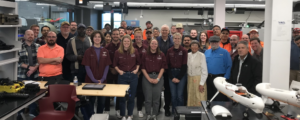

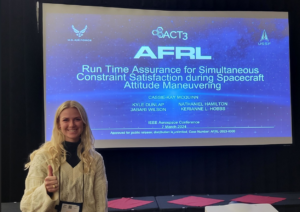
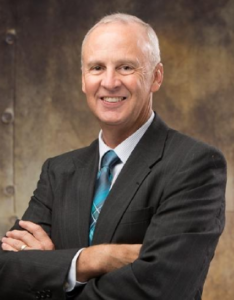
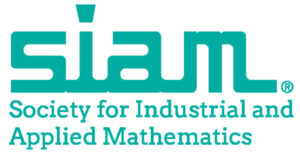
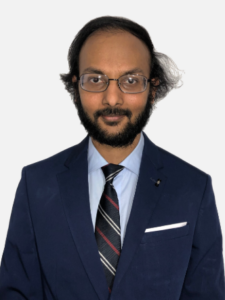
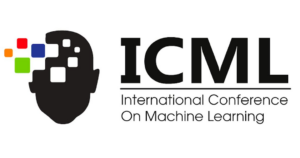
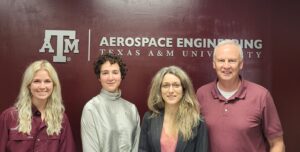 VSCL hosted Dr. Dimitra Panagou, Associate Professor with the
VSCL hosted Dr. Dimitra Panagou, Associate Professor with the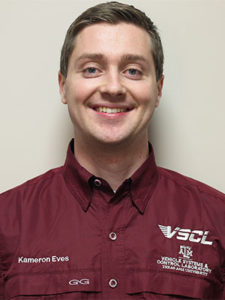 Kameron Eves will be presenting the paper “Introduction to Adaptive Control for Multiple Time Scale Systems”. Eves presents a novel approach to Adaptive Control for Multiple Time Scale Systems with
Kameron Eves will be presenting the paper “Introduction to Adaptive Control for Multiple Time Scale Systems”. Eves presents a novel approach to Adaptive Control for Multiple Time Scale Systems with 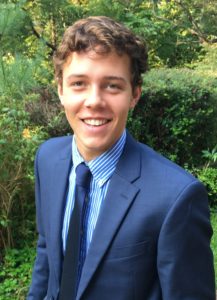 David Van Wijk will be presenting the paper “Deep Reinforcement Learning Controller for Autonomous Tracking of Evasive Ground Target”. Van Wijk presents a method of tracking an evasive ground target using deep RL on a rotorcraft wherein the target attempts to hide behind occlusions. A variety of environment conditions are trained and evaluated, resulting in an agent able to successfully track a randomly moving target with the presence of occlusions.
David Van Wijk will be presenting the paper “Deep Reinforcement Learning Controller for Autonomous Tracking of Evasive Ground Target”. Van Wijk presents a method of tracking an evasive ground target using deep RL on a rotorcraft wherein the target attempts to hide behind occlusions. A variety of environment conditions are trained and evaluated, resulting in an agent able to successfully track a randomly moving target with the presence of occlusions.
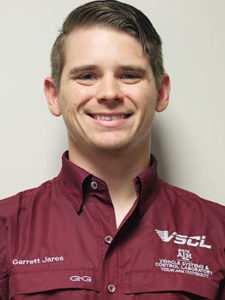 Dr. John Valasek, Professor in the Department of Aerospace Engineering at Texas A&M University and Director of the Vehicle Systems & Control Laboratory, and VSCL student Garrett Jares gave a virtual seminar titled “Control Acquisition Attack of Aerospace Systems via False Data Injection of Sensor Data” for Sandia National Laboratories. The seminar was presented as part of a monthly seminar series for the Science and Technology Advancing Resilience for Contested Space (STARCS) Mission Campaign. The date of the seminar was 28 February 2022.
Dr. John Valasek, Professor in the Department of Aerospace Engineering at Texas A&M University and Director of the Vehicle Systems & Control Laboratory, and VSCL student Garrett Jares gave a virtual seminar titled “Control Acquisition Attack of Aerospace Systems via False Data Injection of Sensor Data” for Sandia National Laboratories. The seminar was presented as part of a monthly seminar series for the Science and Technology Advancing Resilience for Contested Space (STARCS) Mission Campaign. The date of the seminar was 28 February 2022.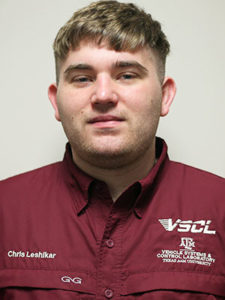 Chris Leshikar ’20 presented the paper “Asymmetric Quadrotor Modeling and State-Space Identification”, which addresses system identification flight test results of an asymmetric quadrotor. The goal of the flight tests was to obtain a linear state-space model of an asymmetric Modified F450 quadrotor using the Observer/Kalman Identification (OKID) algorithm. Automated excitation maneuvers were injected using the Developmental Flight Test Instrumentation Two (DFTI2) system. The identified models obtained from the flight tests are then compared to analytical state-space models derived and presented in the paper. The identified linear state-space model using automated excitations matched reasonably well with the nonzero elements of the analytical linear state-space model.
Chris Leshikar ’20 presented the paper “Asymmetric Quadrotor Modeling and State-Space Identification”, which addresses system identification flight test results of an asymmetric quadrotor. The goal of the flight tests was to obtain a linear state-space model of an asymmetric Modified F450 quadrotor using the Observer/Kalman Identification (OKID) algorithm. Automated excitation maneuvers were injected using the Developmental Flight Test Instrumentation Two (DFTI2) system. The identified models obtained from the flight tests are then compared to analytical state-space models derived and presented in the paper. The identified linear state-space model using automated excitations matched reasonably well with the nonzero elements of the analytical linear state-space model.